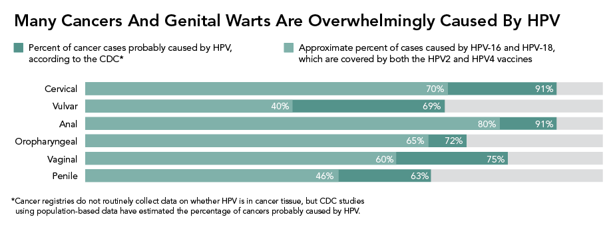Although there’s no cure for cancer, there is a vaccine that can help lower Americans’ risk of getting several different types of the disease. It’s been widely available for nearly a decade, and federal health officials recommend that all young Americans should get it as a preventative measure to protect them against cancer. But we still aren’t giving it to most of our kids.
Why? Because Americans are squeamish about sexual health — and ultimately don’t understand what’s at stake.
The vaccine in question here is the three rounds of shots to prevent the transmission of the human papillomavirus, or HPV. Most Americans think of HPV as a sexually transmitted infection, and that’s certainly true: it’s one of the most common STDs in the country. But it’s also responsible for several different types of cancer, according to data from the Centers for Disease Control and Prevention:

The introduction of the HPV vaccine in 2006 was an important advancement in public health. Researchers have found that HPV rates among teen girls were cut in half after the vaccine first went public. But we could be making even more progress in this area if more parents were making sure their kids get the shots. The rate of HPV vaccination in the U.S. hovers around 30 percent, far below the vaccination rates in other countries. For instance, in Rwanda, more than 90 percent of teen girls are vaccinated against HPV.
Those stats are troubling for public health officials — particularly because it’s not hard to extrapolate the potentially dire consequences. The rates of HPV-related cancers have been on the rise in recent years. In the South, where girls have disproportionately low rates of HPV vaccination, adult women have disproportionately high rates of cervical cancer.
The ongoing resistance to vaccinating kids against HPV is two-fold. On one hand, an increasing number of U.S. parents are skeptical about vaccines in general, and some still erroneously believe that the HPV shot isn’t safe. To make matters worse, Americans tend to be uncomfortable with giving young people the resources they need to protect their sexual health. Some parents believe that the HPV shot will encourage kids to have risky sex, even though there’s absolutely no link between the vaccine and promiscuous sexual behavior.
And a lot of people still aren’t making the connection between this vaccine and their kids’ health. About 70 percent of American adults don’t realize that the HPV shot can protect against cancer. About a quarter of parents surveyed by the CDC in 2013 said they didn’t plan to give their daughters the shot within the next year, largely because they don’t believe it’s necessary.
Health officials continue to try to figure out how to persuade more people to get their three doses of the HPV vaccine, which is now recommended for all pre-teen girls and boys. It’s perhaps understandable why they’re getting a little frustrated. “This is a vaccine that protects against cancer; what could be better than that?” Shannon Stokley, a CDC epidemiologist, recently pointed out to NPR.
